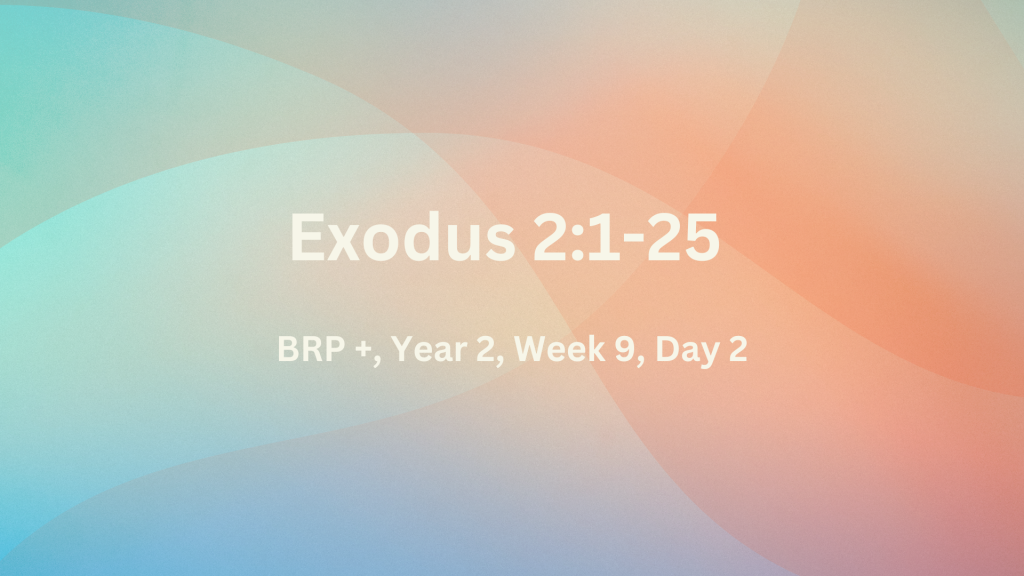Exodus 2:1-25
Q.1. Into which tribe was Moses born? Why was he placed in a basket on the Nile River? How was he saved? Who raised Moses for Pharaoh’s daughter? What was his weakness and sin? – (Ex.2:1-12)
Moses was born in Egypt to Amram and Jochebed, from the tribe of Levi (Ex.2:1 c.f. Ex.6:20). His mother loved her baby, and defied the king’s edict, and hid him for 3 months (Ex.2:2 c.f. Heb.11:23). When the hiding of Moses became impossible, Jochebed set him afloat on the Nile in a wicker basket. His sister kept watch (Ex.2:3-4). By the providence of God, the daughter of Pharaoh found Moses, and though she knew that he was one of the Hebrew children – … she had pity on him (Ex.2:5-6). Jochebed had acted in faith. She was duly rewarded with the joy of nursing her own son, while being paid for the privilege of raising him during his formative years (Ex.2:7-9 c.f. Heb.11:6, 23). In time, Pharaoh’s daughter adopted him as her own son and named him Moses – because I drew him out of the water (Ex.2:10). When Moses grew up, he – … went out to his brethren and looked on their hard labours; and he saw an Egyptian beating a Hebrew, one of his brethren (Ex.2:11). He identified with the Hebrews as his brethren – so he looked this way and that, and when he saw there was no one around, he struck down the Egyptian and hid him in the sand (Ex.2:12). Later, Moses’s anger would be his undoing again (Ex.2:15 c.f. Num.20:10-11; Dt.1:37; 3:23-27).
Q.2. Were the efforts of Moses appreciated by the Hebrews and Pharaoh? Where did he find a new beginning? How was life for the sons of Israel? On what basis did God respond to their cries? – (Ex.2:13-25)
If Moses thought his efforts on behalf of his people would be appreciated, he was soon disappointed (Ex.2:13-14). His crime became known to Pharaoh, who tried to kill him (Ex.2:15). Therefore, Moses fled to Midian, where he happened to meet the seven shepherd daughters of the priest in Midian. He fought off a group of other shepherds who were mistreating the women (Ex.2:16-17). Their father invited Moses to stay with them. In time Moses married the priest’s daughter Zipporah (Ex.2:19-21). At forty years of age, Moses had a new beginning, learning about life in the wilderness. He had a son named Gershom (Ex.2:22). By contrast, life was hard for the Hebrews – … and the sons of Israel sighed because of the bondage, and they cried out; and their cry for help because of their bondage rose up to God (Ex.2:23). God responded to Israel’s cries, in keeping with His covenant – 24 … and God remembered His covenant with Abraham, Isaac, and Jacob. 25 God saw the sons of Israel, and God took notice of them (Ex.2:24-25). NOTE: The father-in-law of Moses is variously called by the name of Reuel (Exo.2:18), Jethro (Exo.3:1; 18:1-2), and Hobab, the son of Reuel (Num.10:29; Jdgs.4:11). He was known as the priest of Midian and belonged to the nomadic Kenites (Jdgs.1:16; 4:11). The Rechabites descended from the Kenites (2 Kgs.10:15; 1 Chron.2:55). They became a powerful witness of faithfulness, in support of the ministry of Jeremiah the prophet (Jer.35:1-11). God rewarded them by promising the Rechabites – Jonadab, the son of Rechab shall not lack a man to stand before Me always (Jer.35:19).

